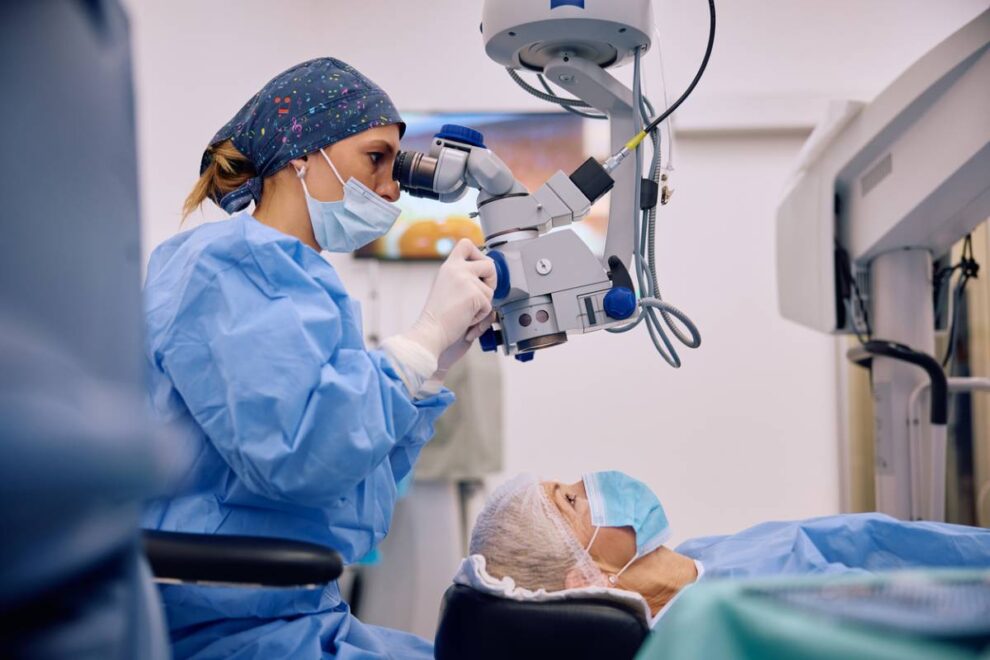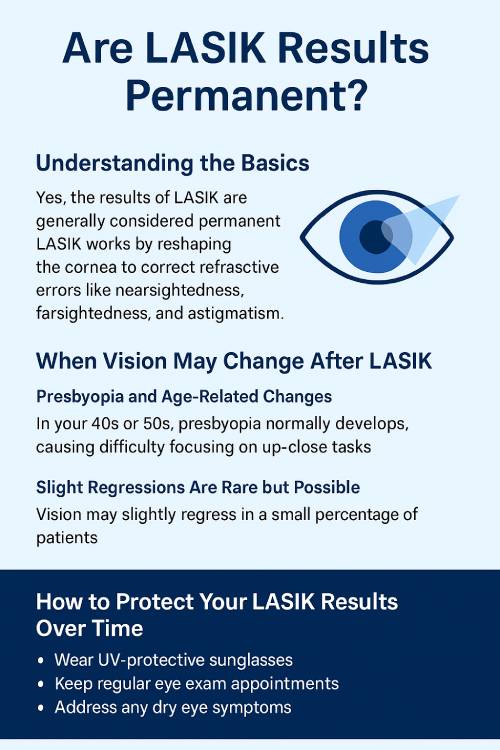Posted by: Caster Eye Center in laser vision correction

If you’re considering LASIK, chances are you’re tired of the daily frustration that comes with glasses or contact lenses. We’re talking blurry mornings, foggy lenses, misplaced frames, and the constant upkeep. The idea of waking up with clear vision is undeniably appealing, but it’s natural to wonder: Are LASIK results permanent, or will you be back to squinting a few years down the road?
Understanding the long-term results of LASIK is a key part of deciding whether it’s right for you. After all, you naturally want to invest in something that lasts and isn’t just a quick fix. In this post, we’ll break down what “permanent” really means when it comes to laser vision correction, what factors can influence your results over time, and how to protect your vision for the long haul.
Are LASIK Results Permanent? Understanding the Basics

Yes, the results of LASIK are generally considered permanent. LASIK works by reshaping the cornea, the clear front surface of the eye, to correct refractive errors like nearsightedness, farsightedness, and astigmatism. Once the cornea is reshaped, it does not “grow back” or revert to its previous form.
Most patients experience dramatically improved vision immediately or within a few days after the procedure. In fact, studies show that more than 95% of LASIK patients achieve 20/40 vision or better, and many achieve 20/20 or even 20/15 vision. These changes are permanent for the vast majority of people, especially when LASIK is performed after vision has stabilized.
When Vision May Change After LASIK
Now, while the corneal correction itself is lasting, it’s important to remember that your eyes can continue to change naturally over time, just as they would whether you had LASIK or not. These changes are typically due to aging rather than the LASIK procedure itself.
Presbyopia and Age-Related Changes
In your 40s or 50s, it’s normal to develop presbyopia, a condition where the lens inside the eye becomes less flexible, making it harder to focus on close objects. This is why many people start to need reading glasses, even if they have perfect vision before. LASIK doesn’t prevent presbyopia, but it doesn’t cause it either.
Slight Regressions Are Rare but Possible
In a small percentage of patients, vision may slightly regress after LASIK. This is more likely if the surgery was performed while the vision was still changing (often in younger individuals) or in those with high prescriptions. Fortunately, when regression does happen, it’s typically minor, and a follow-up enhancement procedure can correct it.
What to Expect from Long-Term LASIK Outcomes
Many LASIK patients enjoy clear vision for decades without needing any additional procedures. One of the most important factors in achieving long-term results is selecting an experienced and highly skilled laser eye surgeon. At Caster Eye Center, Dr. Andrew Caster has performed over 30,000 procedures with a strong focus on precision and patient satisfaction.
How to Protect Your LASIK Results Over Time
To keep your eyes healthy and your vision as stable as possible post-LASIK:
- Wear UV-protective sunglasses to reduce long-term damage from sun exposure
- Keep regular eye exam appointments to monitor your overall eye health
- Address any dry eye symptoms promptly
- Inform your eye doctor of any vision changes, no matter how minor.
Remember, LASIK doesn’t stop your eyes from aging, but it gives you a strong foundation for excellent vision that lasts. With proper care, many patients report clear, glasses-free vision even 20 years after their procedure.
What If My Vision Changes Years After LASIK?
If your vision does begin to shift many years after LASIK, you still have options. In some cases, an enhancement procedure can be performed to fine-tune your vision. This is typically offered if the original LASIK flap and corneal structure are still suitable.
For others, especially those dealing with presbyopia, options like monovision LASIK (where one eye is corrected for distance and the other for near vision) or reading glasses may become helpful.
LASIK Isn’t Just About Today, But About the Years Ahead
Choosing LASIK is more than a quick fix; it’s a step toward long-term visual freedom. While natural age-related changes may occur, the reshaping done during LASIK remains permanent. For most people, this means years, and often decades, of clearer vision, reduced dependence on glasses, and increased confidence in everyday life.
Let’s Talk About Your Vision Future
Still wondering whether LASIK is right for you? Schedule a consultation with Dr. Caster at Caster Eye Center to discuss your unique vision goals and long-term expectations with a trusted laser eye surgeon.
